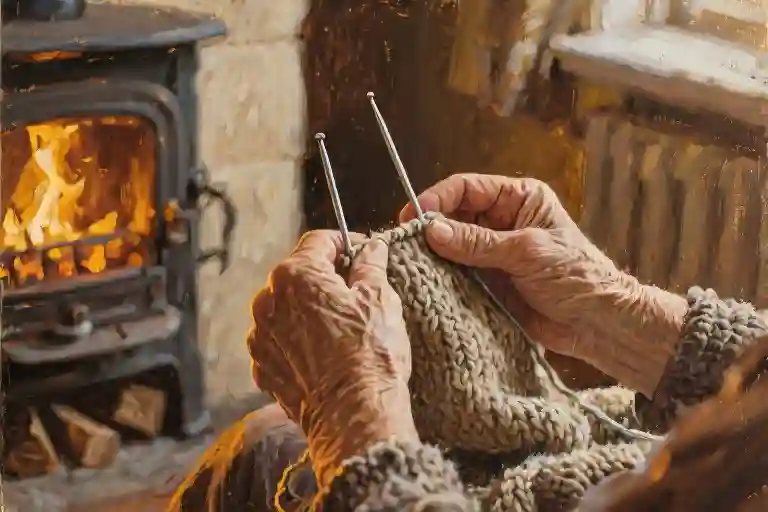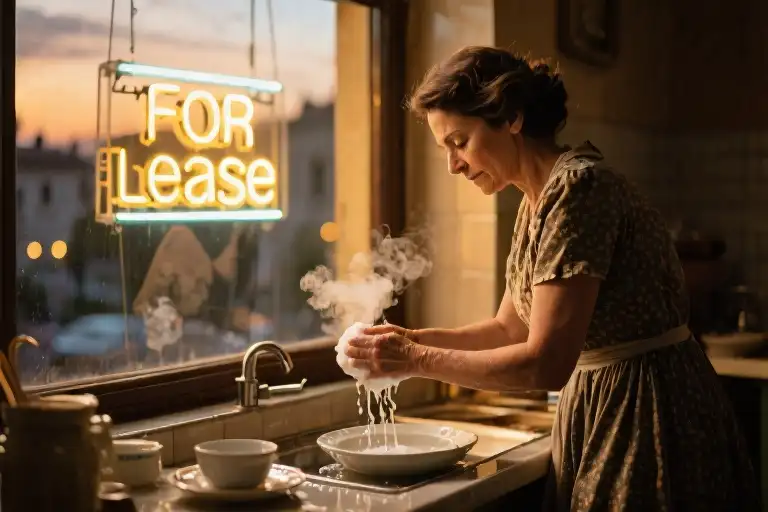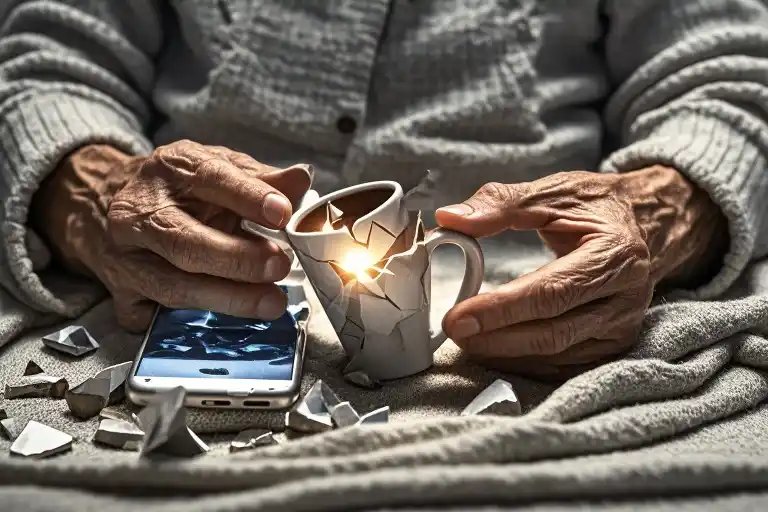The rhythmic click-clack of knitting needles was the soundtrack of my childhood afternoons. Grandma always sat in her rocking chair by the wood stove, the golden light flickering across her silver hair as her hands moved with quiet precision. The wool would slide through her fingers like water, transforming into scarves and mittens that always smelled faintly of lavender and woodsmoke.
She was just Grandma to me then – not old, not sick, just a constant presence as steady as the seasons. Her voice would rise and fall as she told stories about her girlhood in that tiny Carpathian village, about hiding in root cellars when soldiers came, about trading her mother’s silver thimble for a handful of raisins during the hungry winters. I’d curl up at her feet on the braided rug, watching the dance of flames behind the stove’s isinglass window until the needle sounds and her stories blurred together, lulling me into drowsiness.
I remember how she’d pause her knitting then, laying aside the half-finished mitten to tuck the afghan around my shoulders. Her kiss on my forehead felt like sunlight made tangible – warm, gentle, certain. In those moments, wrapped in wool and grandmother-love, the world held no complexities beyond the next stitch in her pattern or the next chapter in her story.
Sometimes the needles would still be clicking when I woke from my nap, their rhythm unchanged, as if Grandma had been knitting the whole time I slept. She’d smile without looking up, her hands never breaking pace. ‘You snore like a little bear cub,’ she’d say, and I’d protest while she laughed, the sound rich as honey dripping from a spoon.
Those knitting needles measured out my childhood in scarves and socks and sweaters. I didn’t know then that their steady rhythm was counting down to something else entirely.
The rhythmic click of knitting needles was the soundtrack of my childhood winters. Grandma would sit by the wood stove, her silver hair catching the orange glow, while her hands moved with quiet precision. The wool between her fingers smelled faintly of lavender from the sachets she kept in her dresser drawers. I’d curl up on the braided rug beside her, tracing the patterns her needles made as they dipped and rose like tiny fishing rods catching stitches instead of fish.
She always kept an extra blanket draped over the arm of her rocking chair – the one with satin edges I’d rub between my fingers until they grew warm. When my eyelids grew heavy, she’d pause her knitting just long enough to tuck the blanket around my legs. Her kiss on my forehead carried the scent of rosewater and the faintest hint of the peppermints she kept in her apron pocket.
‘Did I ever tell you about the winter we ate dandelion soup?’ she’d ask, her needles never slowing. Her stories unfolded like the scarves she knitted – long, colorful, and full of unexpected twists. She spoke of village winters during the war, where frost painted the inside of windowpanes and children’s laughter echoed through empty flour sacks turned into coats. The way she described chewing pine needles to fool empty stomachs made my own after-school hunger seem trivial.
Sometimes I’d wake to find her still knitting, the fire now embers, her face lit only by the single bulb hanging from the ceiling. In those quiet moments before she noticed I was awake, I’d watch her lips move silently as she counted stitches, her eyebrows knitting together with the same concentration she used to untangle my hair after a day playing outside. The stove’s warmth, the wool’s itch against my cheek, the metronome of her needles – these were the constants that made Grandma’s house different from every other place in the world.
What I didn’t understand then was how those same knitting needles sometimes slipped from her fingers in midsentence. How she’d stare at the half-finished mitten in her lap as if it belonged to someone else. The way she’d occasionally repeat the same war story twice in one afternoon, her voice bright with the same surprise at the ending. To me, these were just Grandma being Grandma – like how she always burned the first batch of cookies or forgot where she’d left her reading glasses.
The wool still smells like lavender when I unpack winter clothes each year. But now I recognize what I couldn’t see then – how the woman who taught me to count by casting on stitches was herself slowly unraveling.
The Adventures We Shared
My grandmother moved through the world with a quiet fearlessness that never registered as extraordinary to my childhood mind. The day she scaled the splintered wooden fence of the abandoned house to retrieve my soccer ball remains etched in memory – not for its danger, but for how ordinary it felt when she handed me the ball with grass-stained knees and a conspiratorial wink. She smelled of lavender sachets and wood smoke as she brushed the dirt from her housedress, humming one of those old village tunes she never named.
That same summer, she taught me to ride the pink bicycle with tasseled handlebars that had occupied our narrow garage for months. Our alleyway became a grand racetrack, its uneven cobblestones treacherous under training wheels. ‘Pedal like you mean it!’ she’d call from behind, her voice carrying the same steady rhythm as her knitting needles. When I finally wobbled the full length to the park without falling, her applause sounded louder than all the neighborhood children combined. The way she beamed at me then, cheeks flushed like the geraniums in her window boxes, made the scraped elbows worthwhile.
Looking back, I realize these adventures held a particular magic because they existed outside time. Grandmothers in storybooks sat in rocking chairs, but mine climbed fences and ran alongside bicycles, her gray braid coming undone in the wind. Only now do I recognize the significance of her insistence on these physical feats – the way she’d pause afterward to catch her breath near the woodpile, or how her hands trembled slightly when retying her apron strings. At seven years old, I simply assumed all grandmothers possessed this quiet strength, this determination to create ordinary miracles between laundry days and medication schedules.
What I remember most isn’t the scraped knees or the triumphant bike rides, but the way she made every small adventure feel like a shared secret. ‘Our little expeditions,’ she called them, as if we were the first people to discover the thrill of a recovered ball or the freedom of two wheels on pavement. The pink bicycle eventually rusted in the rain, but thirty years later, I still feel her steadying hand between my shoulder blades whenever I face something new.
The Whispered Conversations
The house always carried sounds differently in the evenings. The rhythmic click of Grandma’s knitting needles would mingle with the hiss of the wood stove, creating a kind of nighttime lullaby. I’d curl up on the braided rug near her feet, half-listening to her stories about village winters during the war, half-drifting into sleep. That’s when the other sounds began – the hushed tones from the kitchen that weren’t meant for my ears.
“She needs help,” my father’s voice carried just enough to reach me, though he clearly thought I was asleep. The words had a weight to them that made my stomach tighten, though I couldn’t explain why. Grandma seemed fine to me – she’d just fixed my favorite sweater that afternoon, her fingers moving as deftly as ever through the yarn.
“Is she in that phase again?” My mother’s reply came softer, like she was turning away toward the sink. There was something in her voice I’d never heard when she spoke to me about scraped knees or lost homework – a kind of tired worry that didn’t belong in our yellow-lit kitchen.
I pretended not to hear when they mentioned medication. In my world, medicine came in cherry-flavored syrups that made sore throats better, or bright bandaids that magically stopped tears. The little orange bottles on Grandma’s nightstand never seemed important – just more adult things like coffee grinders or checkbooks that didn’t concern me.
Sometimes I’d catch them mid-conversation, voices dropping suddenly when I entered a room. They’d exchange glances I couldn’t decipher, then my mother would ask too brightly about school while my father suddenly found urgent business with the thermostat. The air would feel thick with words unsaid, pressing against my skin like humidity before a storm.
Once, I came across an open pill organizer on the counter, its little compartments labeled with times I didn’t understand. When I asked why Grandma needed so many, my mother just said “to help her remember things” in a tone that ended further questions. It made no sense – Grandma remembered everything important. She never forgot my birthday, or how I liked my hot chocolate with extra marshmallows, or where she’d hidden the Christmas presents.
Now I recognize those fragmented conversations for what they were – the early tremors of something much larger that adults try to shield children from. But back then, they were just puzzling interruptions in a world where Grandma remained unchanged: the woman who could scale fences for stray balls, who patiently walked beside my wobbling bicycle, whose lap remained the safest place to be when thunder rattled the windows.
The knitting needles never stopped their steady rhythm during those whispered exchanges. Maybe that’s why I never truly believed anything was wrong – because as long as I could hear that familiar click-click-click from her rocking chair, everything still felt normal in the most important ways.
The Silence We Carry
Years later, the memories remain vivid—the rhythmic click of her knitting needles, the way she’d hum off-key while turning the heel of a sock. But now I notice what child-me couldn’t: the same half-finished scarf in her basket every winter, the wood stove left burning dangerously high. At the time, these were just Grandma’s quirks, like how she preferred tea with three sugars or saved every rubber band in a jam jar on the windowsill.
Families develop their own language for the unspoken. \”She’s having one of her days,\” my mother would say, which meant Grandma had forgotten my name again. \”Be patient with her,\” translated to: don’t startle her when she mistakes the linen closet for the bathroom. We perfected this dance of avoidance—smoothing over misplaced eyeglasses as if they’d always belonged in the refrigerator, laughing when she wore slippers to church.
The medications I finally understood weren’t in colorful syringes like my cherry-flavored antibiotics. They came in orange bottles with safety caps, lined up on the kitchen windowsill where the light could catch their labels. Sometimes I’d find a pill crushed into the butter dish, or floating in her untouched coffee.
What stays with me isn’t just the forgetting, but how hard she fought to preserve the rituals. She might not recall my school grade, but her hands still moved through knitting patterns muscle memory had preserved for sixty years. When she taught me to cast on stitches, her fingers trembled—not from uncertainty, but from the sheer effort of holding the lesson in her mind long enough to pass it on.
Every family contains these quiet negotiations with time. Maybe yours has different signs: a grandfather who insists he’s fine to drive while his keys disappear into odd drawers, an aunt who repeats stories within the same conversation. We paper over the gaps with what we call kindness—correcting gently, pretending not to notice, keeping our worries in the hushed tones I once overheard by the laundry room.
The cruelest part of loving someone through decline is the hindsight. Photographs show the clues we missed: the increasingly lopsided sweaters she made me, the way her handwritten recipes began omitting key ingredients. At what point does accommodation become complicity? When does protecting someone’s dignity start erasing their reality?
Perhaps you’ve faced versions of this in your own family. The unasked questions that hang between generations, the medical pamphlets left casually on coffee tables like landmines no one wants to trigger. There’s no perfect way to navigate this, only the imperfect attempts—the way we ration truth like sugar cubes, dissolving it slowly in the tea of ordinary days.
The rhythmic click of knitting needles used to be the soundtrack of my childhood afternoons. She was just Grandma then—the steady presence by the wood stove, her silver hair catching the firelight as she turned balls of yarn into sweaters with slightly uneven sleeves. The sound would slow as she paused to adjust her glasses or sip tea, then pick up speed again like a heartbeat finding its rhythm. I’d doze off to that cadence, only to wake later with one of her hand-knit blankets tucked around me, its wool smelling faintly of lavender and woodsmoke.
Years later, I finally noticed what my younger self had missed—how the pauses between the clicks grew longer. How sometimes the needles would stop altogether while she stared at the half-finished scarf in her lap, as if the pattern had dissolved into the wool. Back then, I thought she was simply remembering better days. Now I recognize those silences for what they were.
The pink bicycle still leans against the garage wall where she last propped it, its training wheels rusted in place. I can almost hear her calling from the end of the alley—that particular lilt she used when proud, halfway between a laugh and a cheer. She had infinite patience for my wobbling attempts, never mentioning how many times she’d bent down to adjust the same loose bolt.
These days when I visit home, I catch myself listening for the needles. The house keeps different rhythms now—the hum of a microwave, the ping of medication reminders on someone’s phone. We’ve all become fluent in the language of careful glances and half-finished sentences.
That’s the peculiar weight of growing up: realizing how much love can coexist with helplessness, how the same hands that pulled you from swimming pool edges might later need steadying themselves. The grandmother who scaled fences for stray balls now hesitates before stepping off curbs. The stories she once told with such vivid detail have condensed to fragments, like pages missing from a favorite book.
Perhaps this is why we return to certain memories—not to dwell in the past, but to reclaim the clarity we lacked when living it. To finally understand what the child overhearing whispered conversations couldn’t: that love isn’t diminished by needing help, any more than a sweater is undone by a single dropped stitch.
When did you first notice the gaps in your own family’s stories? The moments where what went unsaid became its own kind of truth?





